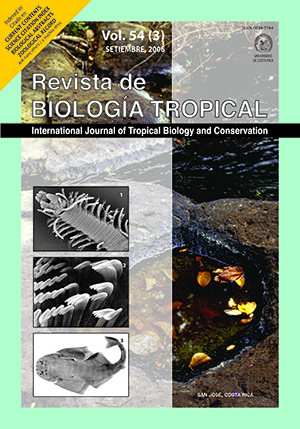Abstract
A total of 311 sharptooth smooth-hound Mustelus dorsalis were collected in the Gulf of Nicoya, Costa Rica from March 1999 to May 2000 to determine reproduction and feeding habits. The fishes were collected using hook and line. 250 females and 61 males were identified. The females are bigger (550-660 mm) and heavier (400-1 000 g) than males (500-585 mm and 200-300 g, respectively). All samples collected were mature and the minimum length to first maturity observed is 500 and 541 mm for females and males, respectively. From September to March individuals were mature, while samples caught during April and August were immature. A total of 1 259 embryos were analyzed. Number of embryos per liter ranged from two to six, the total length is from 130 to 205 mm and the weight from 6 to 35 g. This shark is a polyphagous opportunistic carnivore that preys on crustaceans (Squilla hancocki, S. parva, Litopenaeus sp.), fishes (Anchoa sp., Caranx sp., Lutjanus sp., Engraulis sp.) and mollusks (Loligo sp. and Octopus sp.). Main prey item was S. hancocki. The presence of mature sharks of both sexes along the year and the consumption of food items associated to shallow coastal rocky waters suggest that this sector of Nicoya Gulf is a nursery ground and an essential habitat. Based on these results the establishment of an integral management plan is proposed.
##plugins.facebook.comentarios##

This work is licensed under a Creative Commons Attribution 4.0 International License.
Copyright (c) 2006 Revista de Biología Tropical






